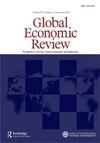Household’s Happiness and Financial Market Participation
IF 2.6
4区 经济学
Q2 ECONOMICS
引用次数: 3
Abstract
ABSTRACT Using the 2014 China Family Panel Studies, this study examines the impact of household’s subjective well-being on financial decision. It investigates whether happiness affects household’s decision to participate in risky financial market. This study finds a non-linear relationship between happiness and the probability of financial market participation. The probability of risky financial market participation increases as self-reported happiness measure increases. However, the probability declines slightly at the highest level of self-reported happiness measure. In order to address a potential endogeneity problem, this study uses the Two Stage Least Squaredmodel with two sets of instrumental variables. These findings provide a strong support for the hypothesis that a person’s subjective well-being is one of the major determinants of household’s economic behaviours, and provide an important implication on household portfolio research.家庭幸福感与金融市场参与
摘要本研究利用2014年中国家庭面板研究,考察了家庭主观幸福感对财务决策的影响。它调查幸福感是否影响家庭参与高风险金融市场的决定。本研究发现幸福感与金融市场参与概率之间存在非线性关系。风险金融市场参与的可能性随着自我报告的幸福指数的增加而增加。然而,在自我报告的幸福测量的最高水平上,这种可能性略有下降。为了解决潜在的内生性问题,本研究使用了两组工具变量的两阶段最小二乘模型。这些发现有力地支持了个人主观幸福感是家庭经济行为主要决定因素之一的假设,并为家庭投资组合研究提供了重要启示。
本文章由计算机程序翻译,如有差异,请以英文原文为准。
求助全文
约1分钟内获得全文
求助全文

 求助内容:
求助内容: 应助结果提醒方式:
应助结果提醒方式:


